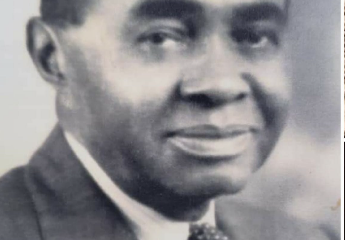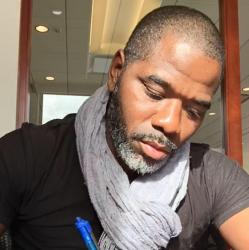Featured
Night Two in Detroit: Booker Stepped Up Amid Predictable Rhetoric

The second night of the debate wasted little to no time before the fireworks erupted when protesters interrupted New Jersey Senator Cory Booker and New York Mayor Bill Blasio during their opening statements, shouting for the firing of the police officer whose illegal chokehold caused Eric Garner’s 2014 death. It was only the beginning of an evening marked by onstage verbal attacks.
On the topic of healthcare California Senator Kamala Harris and former Vice-President Joe Biden dominated. They made 15 of the 26 statements. While most of what they said were pot shots at the other, Harris maintained that her plan will change and reduce the role employer-based insurance plans by establishing a “Medicare-for-all” system over 10 years, a timeline Biden says he doesn’t trust. He only candidate who opposed universal healthcare was Colorado Senator Michael Bennett who believes it will give Trump four more years in the White House.
When the conversation switched to immigration, Biden remained the target for nearly all candidates, and while he spoke nearly three times more than any other candidate, he spent much of it defending former President Barack Obama’s deportation record. De Blasio delivered a punch when he asked the former Vice President directly if he thought it was right or wrong for Obama to deport more undocumented immigrants than any other president. Before Biden responded, protesters interrupted demanding an answer for the massive number of deportations under Obama. Biden cautioned against comparing Obama’s record to Trump’s. Booker pointed out Biden “couldn’t have it both ways” because he has invoked Obama more than anyone in the race. We did learn that Harris, New York Senator Kristin Gillibrand, Booker, and former Housing Secretary Julian Castro are great advocates for decriminalization of those crossing the southern border.
It is almost impossible for me to believe that this debate and the one Tuesday night lasted the same amount of time. This stems from the debating styles of the candidates, and it was quite clear during the conversation surrounding free college which only Hawaii’s Congresswoman Tulsi Gabbard answered. The conversation about race was also lackluster especially since there were five minority candidates on stage. Gillibrand presented herself as the candidate who can explain ‘White privilege’ to white women in the suburbs, and unlike Tuesday night’s debate, the word reparations was not heard one time. Several candidates did say the family of Eric Garner deserves justice.
The most memorable moment of the conversation around criminal justice was Booker’s “Kool-Aid” zinger when Biden criticized Booker’s record as mayor of Newark. Booker shot back with, “…you’re dipping into the Kool-Aid and don’t even know the flavor.” Gabbard also challenged Harris on her record as Attorney General of California. Yet and still there was little substance. Castro promoted his police reform plan which calls for ending qualified immunity for police officers.
Washington Governor Jay Inslee distinguished himself during the climate change discussion pointing out that middle-of-the-road policies will not correct the current problem, and entrepreneur Andrew Yang proclaimed that anything the country does is already ten years too late.
One of the low points of the debate centered around what it takes to beat Trump. The conversation started with Biden touting Obama era policies that helped get Detroit out of debt. Harris and Gillibrand said they will remind Americans that Trump lied about what he said he was going to do. And, Booker pointed out that the significant role Black voters will play in winning the 2020 election, and he added that beating Trump is “the floor…not the ceiling” and if elected, his administration would focus on an America that works together.
Ironically, the conversation about the economy was robust and centered around gender pay inequities. Harris was at her best supporting her plan that would impose fines on businesses that do not provide women with equal pay for equal work. Yang, the only non-politician in the race, touted his proposal to give every American a monthly $1,000 stipend.
The footnotes of the debate were the abbreviated conversations about impeachment and foreign policy. The foreign policy conversation centered around Biden’s decision to support Bush in the invasion of Iraq and Biden admitting that he was wrong for trusting Bush. The conversation about Iran was so short and featured a heated exchange between one of the moderators and one of the candidates. Every candidate on stage called for Trump’s impeachment except Bennett who warned about playing into the hands of Republicans prone to acquit Trump if articles of impeachment are filed. Some candidates even went further, saying that they would prosecute Trump after his presidency.
In conclusion, Wednesday night’s debate fell short of Tuesday’s. We watched professionals, who are well versed in the art of debate, score points as if the American voters were debate judges waiting to evaluate them on rules. Tonight, no one won and all of us lost.

-

 Black History5 months ago
Black History5 months agoThe untold story of a Black woman who founded an Alabama hospital during Jim Crow
-

 Featured9 months ago
Featured9 months ago‘No Closure’ In Town Where Five Black Residents Were Either Murdered, Died Suspiciously Or Are Missing
-

 Black History10 months ago
Black History10 months agoBlack History Lost and Found: New Research Pieces Together the Life of Prominent Texas Surgeon and Activist
-

 Featured9 months ago
Featured9 months agoFounder of “The Folding Chair” Podcast Calls Montgomery’s Brawl ‘Karma’
-

 Featured8 months ago
Featured8 months agoThousands ‘Live Their Dream’ During National Black Business Month
-

 Featured11 months ago
Featured11 months agoJuneteenth And ‘246 Years Of Free Labor’ Are Key To Conversations About Reparations









